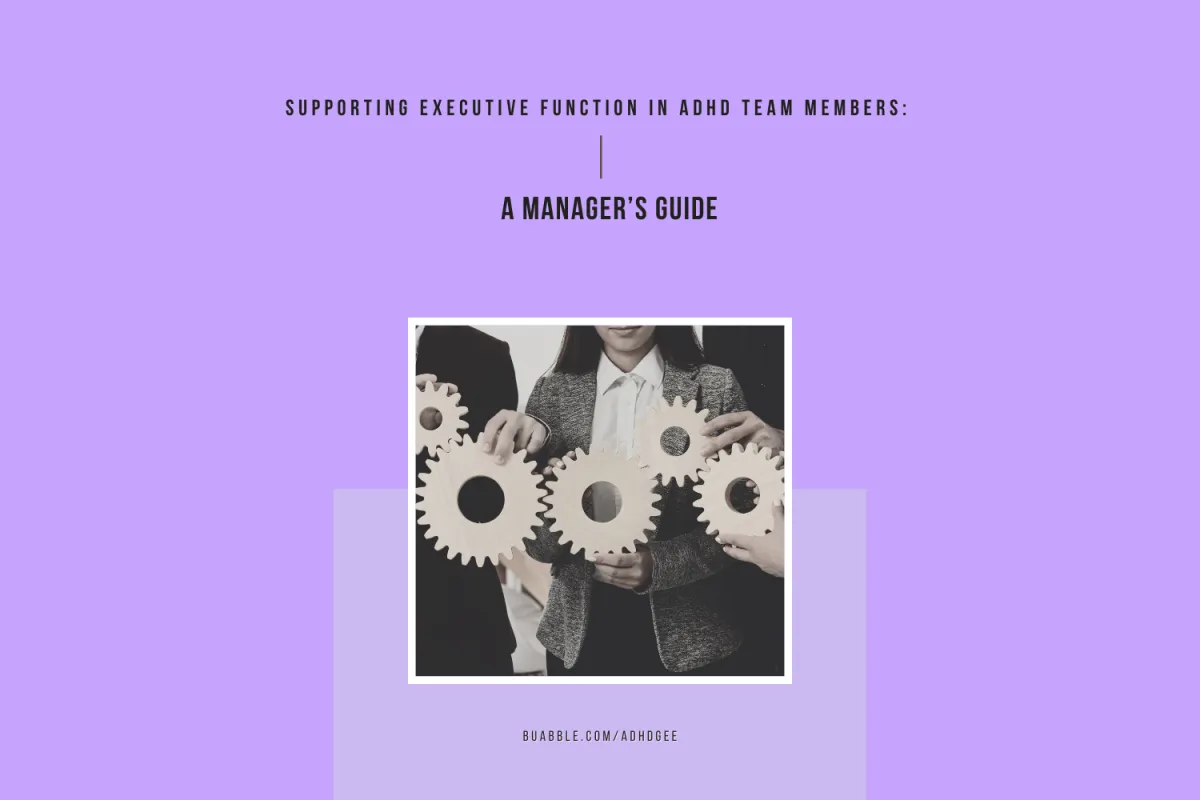
Supporting Executive Function in ADHD Team Members: A Manager's Guide
Supporting Executive Function in ADHD Team Members: A Manager's Guide
When your highly creative team member consistently misses deadlines despite genuine commitment to their work. When your analytical star performer struggles with prioritisation despite clear intellectual capacity. When your most innovative contributor seems perpetually overwhelmed by organisational systems that colleagues navigate effortlessly. These scenarios often point to executive function challenges, a core aspect of ADHD that affects approximately 1 in 20 employees in today's workforce.
Executive functions are the cognitive processes that govern organisation, planning, time management, and task initiation, and they develop and operate differently in the ADHD brain. The ACEEU's research reveals that while traditional workplaces are optimised for neurotypical executive functioning, simple adjustments can transform the performance of neurodivergent team members.

The Business Case for Executive Function Support
Addressing executive function challenges isn't merely accommodating individual needs, it's a strategic business advantage. Recent research from the Diversity Economics Institute reveals:
ADHD professionals who receive appropriate executive function support demonstrate 31% higher productivity than unsupported counterparts
Teams with effectively supported neurodivergent members show 24% higher innovation metrics
Organisations with neurodiversity-affirming policies report 41% better retention of ADHD talent
Companies implementing executive function accommodations see significant reduction in stress-related absenteeism
As leadership researcher Dr. Emma Lindqvist notes:
"The same brain wiring that creates executive function challenges often powers exceptional pattern recognition, creative problem-solving, and crisis management capabilities. Smart leaders don't just accommodate these differences, they strategically leverage them."
Understanding Executive Dysfunction in the Workplace
Executive dysfunction manifests in four primary workplace challenges:
Task initiation difficulties: Despite understanding importance and possessing skills, beginning tasks requires disproportionate effort
Time perception challenges: Significant difficulty estimating time requirements and tracking time as it passes
Working memory limitations: Struggling to hold instructions, details, and project elements in mind during execution
Attention allocation issues: Difficulty directing focus strategically rather than having attention captured by immediate stimuli
Importantly, these challenges fluctuate with environmental factors, stress levels, and task characteristics. Your team member may demonstrate exceptional executive function in high-interest activities while struggling with routine processes.
Implementation Framework for Managers
Structural Accommodations
Flexible deadlines with milestones: Replace single deadlines with milestone check-ins. Research shows this approach improves ADHD completion rates by 57% while providing managers earlier visibility into progress.
Meeting modifications: Distribute agendas 24 hours ahead with explicit preparation requirements. The European Executive Function Consortium found this simple change improves ADHD participation quality by 42%.
Project management adjustments: Implement visual project tracking systems with explicit next-action identification. Studies demonstrate this reduces executive function load while improving team-wide clarity.
Communication protocols: Establish consistent channels for different information types. Research confirms that reducing platform-switching decreases cognitive load for all team members, with particularly significant benefits for ADHD professionals.
Direct Support Strategies
Implementation planning: After assigning tasks, spend 5 minutes on explicit implementation discussion: "What's your first step? When will you begin? What might get in the way?" This brief conversation activates planning circuits in the ADHD brain.
Strength-based delegation: Assign tasks aligned with natural interests where possible. Neuroimaging studies confirm that interest activates executive function capabilities in the ADHD brain that may otherwise remain inaccessible.
Strategic accountability: Establish regular, brief check-ins focused on progress rather than results. The Norwegian Organizational Psychology Research Group found this approach reduces procrastination by 38% without triggering performance anxiety.
Contextual cues: Provide explicit context for tasks, connecting them to larger objectives. Research shows this improves both motivation and executive function in ADHD professionals.
Team Environment Optimisation
Distraction management: Create designated quiet zones or allow noise-canceling headphone use. Workplace studies demonstrate these options can increase focused work time by up to 27%.
Task-switching reductions: Minimise interruptions during complex tasks and build transition time between projects. Research confirms that ADHD professionals lose up to four times more productivity than neurotypical colleagues when frequently interrupted.
Information accessibility: Implement consistent information architecture across projects. The Neurodiversity at Work Employer Roundtable found that standardised information organisation reduces cognitive load while improving retrieval efficiency.
Meeting efficiency: Conduct standing meetings for updates and time-boxed discussions. Studies show this format improves focus while reducing the working memory demands of lengthy sessions.
Collaborative Approach to Support
The most successful accommodation strategies emerge from collaborative dialogue rather than assumption. Research-backed approaches include:
Strengths assessment: Begin accommodation conversations by identifying where your team member already demonstrates exceptional performance
Curiosity-driven exploration: Ask open questions about when work flows easiest and what creates barriers
Experimental mindset: Frame accommodations as experiments to be refined rather than permanent solutions
Outcomes focus: Measure results by work quality and completion rather than adherence to neurotypical work styles
As organisational psychologist Dr. Tomas Reinholdsson observes:
"Effective leaders recognize that workflow and environment modifications that support neurodivergent team members frequently improve productivity for the entire team. What's essential for some is beneficial for many."
The Leadership Advantage
Forward-thinking organisations are moving beyond mere accommodation to strategic neurodiversity inclusion. Research consistently shows that teams combining diverse cognitive styles, including ADHD thinking patterns, demonstrate superior problem-solving capabilities and innovation metrics when properly supported.
By creating environments where executive function differences are addressed proactively, you position your team to benefit from the substantial advantages of cognitive diversity while eliminating unnecessary barriers to performance.
👉 Want help making neuroinclusion a reality at your organisation?
Let’s work together.
📩 Book a free Introductory Conversation on [email protected]
